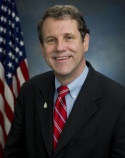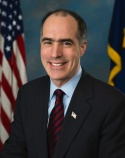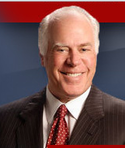You can help empower voters with the information they need when heading to the ballot box. Join the Ballotpedia Society.
War on coal debate
The "war on coal" debate was a major policy debate over federal coal regulations. It was a prominent issue during the 2012 election and the 2014 midterm election, particularly in coal-producing states like Kentucky and West Virginia. Federal coal policy was highly debated after the U.S. Environmental Protection Agency (EPA) began to regulate coal mining and coal-fired power plants in with mercury emission standards in 2011, and carbon emission standards between 2013 and 2015.
Background
In 2011, the U.S. Environmental Protection Agency (EPA) published rules to reduce mercury and other toxic emissions from coal and oil-fired power plants. The EPA argued that power plants were responsible for 50 percent of mercury emissions and 75 percent of acidic gas emissions in the United States. Between 2012 and 2015, the EPA finalized its regulation on power plants called the Clean Power Plan. The rule limits greenhouse gas emissions in all 50 states. The plan set state-specific CO2 emission reductions that the EPA requires each state to meet by 2030.[1]
The term war on coal emerged shortly after the EPA had announced the mercury standards in 2011. Republican lawmakers and candidates, who mostly opposed the regulations, frequently used the term to criticize federal regulations both in Congress and during their election campaigns. Democratic lawmakers and candidates, who mostly supported the regulations, dismissed the idea of a "war on coal." Republicans and coal industry representatives have since called the federal Clean Power Plan (finalized between 2013 and 2015) another round in the "war on coal."[2]
Many Democrats and some Republicans have argued that the negative environmental impacts of coal power outweigh coal’s economic benefits. This group points to technological advances and cost reductions in wind and solar power, which they say deliver strong environmental benefits, such as fewer air pollutants, at minimal cost. Some environmental advocates have argued that reducing or eliminating coal use is necessary to lessen the potential effects of global warming and human-made climate change. Many Republicans and some Democrats have argued that affordable, abundant coal power remains vital to U.S. energy needs and that anti-coal campaigns are often based on unreasonable opposition to the coal industry and other fuels such as oil rather than environmental cost-benefit analyses. This group points out that wind and solar power remain more expensive than coal and should not be forced on U.S. households and businesses. An emerging group of environmental advocates have argued that replacing coal with nuclear power, natural gas, and hydroelectric power delivers superior environmental benefits through more reliable and affordable sources than wind and solar.[3]
2012 election
Presidential election
- See also: 2012 presidential election
During an interview with the San Francisco Chronicle in the 2008 presidential election, then-Sen. Barack Obama said that he supported a plan to cap carbon emissions from coal-fired power plants. "If somebody wants to build a coal-fired power plant, they can. It's just that it will bankrupt them," Obama said. Obama referred to a plan to cap-and-trade carbon emissions from power plants, which was ultimately defeated in the U.S. Senate in 2009 after Obama became president. Obama added, "Under my plan. ...electricity rates would necessarily skyrocket." Obama's statement was viewed as an attack on the coal industry, and an admission that his environmental policies would negatively affect energy affordability by supporting wind and solar energy, which are more expensive, and hurting oil, coal, and natural gas, which are generally cheaper.[4]
The "war on coal" was first used in the 2012 presidential election, mostly by Republican members of Congress and Republican candidates. In his campaign against Obama, Mitt Romney called Obama's policies a "war on coal." Romney called Obama's 2008 statement about bankrupting the coal industry the "one promise he's kept." During a visit to Ohio counties with prominent coal industries, Romney said Obama was "waging a war on coal." Speaking in front of coal workers and miners, Romney said, "We have 250 years of coal, why in the heck wouldn't we use it?. ... We're going to take advantage of our energy resources to save your jobs, to create more jobs."[5] Romney also criticized Obama's coal policies during the first presidential debate. "I like coal. I'm going to make sure we can continue to burn clean coal. People in the coal industry feel like it's getting crushed by your policies," Romney said.[4][6]
Ohio
The race between Democratic Senator Sherrod Brown and Ohio Treasurer and Republican candidate Josh Mandel focused on Ohio's own coal industry, which had 3,191 employees in 2012, according to the U.S. Energy Information Administration (EIA).[7]
The Ohio Coal Association was highly critical of the EPA's coal regulations during the campaign, arguing that almost half of the state's 26 coal-fired power plants were in danger of closing because of the mercury standards. The state received 90 percent of its electricity from coal in 2012. Brown, the incumbent, voted in the U.S. Senate in favor of a resolution supporting the mercury standards. Mandel campaigned against the mercury standards.[8]
During a debate, Brown and Mandel tussled over the war on coal label and whether the EPA's actions constituted an attack on the coal industry. Brown stated, "There is no war on coal. Period." Brown also dismissed the issue as a series of Republican "talking points."[8] Mandel rebutted Brown, saying, "Ladies and gentlemen, there is a war on coal in this country," and accused Mandel and President Obama of supporting it.[8]
Brown defeated Mandel in the general election, 50.7 percent to 44.7 percent.[9]
Pennsylvania
The "war on coal" was debated during the U.S. Senate race in Pennsylvania between Republican Tom Smith and Democratic Senator Bob Casey. The Pennsylvania coal industry employed 8,927 workers in 2012, according to the U.S. Energy Information Administration (EIA).[10] "As the owner of several coal-mining companies, I was on the receiving end of the President's and Bob Casey's costly, job-killing regulations," Smith said of the EPA's policies. Smith also supported a Senate resolution against the EPA's mercury standards. Casey, the incumbent, supported the mercury standards.[11]
The Pennsylvania Republican Party also criticized Sen. Casey's support for the mercury standards. "It's alarming that Bob Casey has officially joined Obama's war on coal by voting with the President instead of the people of Pennsylvania. Coal is a critical industry that creates thousands Pennsylvania jobs, but the Obama-Casey team continues to support EPA regulations that can have economically devastating effects."[12]
Casey defeated Smith in the general election, 53.7 percent to 44.6 percent.[13]
West Virginia
Democratic Senator Joe Manchin and his Republican opponent John Raese challenged each other on their support for the West Virginia coal industry and opposition to the EPA's regulations (both candidates were officially against the EPA's mercury standards). According to the U.S. Energy Information Agency (EIA), the West Virginia coal industry employed 22,786 workers in 2012.[10]
Raese accused Manchin of not doing enough to oppose the Obama administration and the EPA, stating, "President Obama and his out-of-control EPA have done everything in their power to put coal out of business and Joe Manchin has idly stood by while they have done it. Today, because of Joe Manchin's ineffective leadership and President Obama's devastating regulations, it is virtually impossible to build a coal-fired power plant."[14] Raese highlighted how several West Virginia coal companies, such as the Patriot Coal company, had announced bankruptcy. He also pointed out that 500 coal jobs had been cut in recent years due to uncertainty over the EPA's policies. "Patriot Coal is just the latest example of the Obama-Manchin vision for a future without coal," Raese's campaign website stated.[14]
Manchin's campaign responded, highlighting Manchin's vote against the EPA's regulations in the U.S. Senate. "This is politics at its worst. Anyone who would try to claim that Senator Manchin does not stand up for coal and West Virginia's miners is either out of touch or been out of state for too long," Kathy Cosco, communications director for Manchin's 2012 campaign, said in a statement.[15]
Manchin, the incumbent, defeated Raese in the general election, 60.5 percent to 36.5 percent.[16]
2014 election
| McConnell's February 2014 ad focused on coal. |
During the 2014 midterm elections, the "war on coal" remained a strongly debated issue in Kentucky and West Virginia, states containing sizable coal industries. According to the U.S. Energy Information Administration (EIA), the two states employed nearly half of the United States's 89,000 coal workers in 2013.[17]
Kentucky
In 2013, Senator Mitch McConnell (Ky.) appealed to Kentucky voters in an op-ed published early in his re-election bid, soon after the U.S. Environmental Protection Agency (EPA) announced its first draft of the Clean Power Plan, a federal rule regulating greenhouse gas emissions in power plants. McConnell argued that the EPA and the Obama administration's regulations would devastate the state's coal industry, which employed 12,905 Kentucky workers in 2013.[7][18]
McConnell's campaign, and his supporters, broadcasted advertisements throughout the 2014 election cycle. McConnell and his supporters (such as the U.S. Chamber of Commerce) emphasized his opposition to the EPA's coal regulations and the "anti-coal rhetoric" in Washington D.C. McConnell's opponent, Alison Lundergan Grimes, responded in an op-ed article criticizing McConnell's lack of accomplishments in helping the coal industry. Grimes also opposed the EPA's plan.[19][20]
McConnell defeated Grimes in the general election, 56.2 percent to 40.7 percent.[21]
West Virginia
Republican Shelley Moore Capito and Democrat Natalie Tennant held similar views on the coal industry and the EPA's regulations, although Capito rebutted the EPA's plan more forcefully than her opponent. Tennant (a former delegate for Barack Obama at the 2012 Democratic National Convention) kept her distance from the Obama administration and the EPA, criticizing the administration's stance on coal.[22][23]
Capito also introduced the Coal Jobs Protection Act (2013) as a member of the House of Representatives. The bill would have restricted the Environmental Protection Agency's power to enact certain regulations on the coal sector.[24][25]
Capito defeated Tennant in the general election, 62.1 percent to 34.5 percent.[26]
Congress
The "war on coal" label was a popular term used by Republican lawmakers during the 113th United States Congress. According to the Congressional Record, the term was used 100 times in both the House and the Senate between 2013 and 2014. Based on a sample of 50 congressional floor speeches and committee meetings during 2013 and 2014, Senator Mitch McConnell (R-Ky.) used the term more frequently than any other member of Congress.[27]
The table below shows the congressional members who had mentioned the "war on coal" the most during committee meetings and speeches on the House and Senate floors.[27]
| Members of Congress referring to the "war on coal" | ||||
|---|---|---|---|---|
| Member photo | Member of Congress | Chamber | State | References to the "war on coal" in Congress |
 |
Mitch McConnell (R) | Senate | Kentucky | 9 references |
 |
Keith Rothfus (R) | House | Pennsylvania | 6 references |
 |
Andy Barr (R) | House | Kentucky | 5 references |
 |
Shelley Moore Capito (R) | House | West Virginia | 3 references |
 |
Morgan Griffith (R) | House | Virginia | 2 references |
 |
Marsha Blackburn (R) | House | Tennessee | 2 references |
 |
Doug Lamborn (R) | House | Colorado | 2 references |
 |
Jeff Duncan (R) | House | South Carolina | 2 references |
 |
Tom Rice (R) | House | Virginia | 2 references |
| Source: U.S. Congressional Record, "Congressional Record for the 113th Congress" | ||||
Major organizations
Pro-coal groups
- The American Coalition for Clean Coal Electricity (ACCCE) is a 501(c)(6) nonprofit organization that partners with coal companies and other energy industries. The group supports "policies that promote the use of coal, one of America’s largest domestically produced energy resources, to ensure a reliable and affordable supply of electricity to meet our nation’s growing demand for energy." The group has argued that the United States should tap into more of its coal reserves, which are the most abundant of any nation. Further, the group has argued that clean coal technologies should be supported for their role in reducing emissions from coal-fired power plants.[28]
- The American Energy Alliance is a 501(c)(4) nonprofit organization associated with the Institute for Energy Research, a free market-oriented policy group. The group's stated mission is "to enlist and empower energy consumers to encourage policymakers to support free market policies." The group has argued that coal is vital to secure affordable electricity for the United States as well as the developing world. Further, the group has argued that policies supporting the coal industry help keep energy prices affordable and support industries where coal is used to make steel, concrete, soaps, aspirins, plastics, and other goods.[29][30][31]
- The National Mining Association is a 501(c)(6) nonprofit and national trade organization representing miners and those in the mining industry. The group's stated mission is "to build support for public policies that will help Americans fully and responsibly benefit from our abundant domestic coal and mineral resources." The group supports coal mining to reduce U.S. reliance on foreign energy markets, the development of coal-to-liquid technology that would expand coal use to include the transportation sector, and technological development allowing U.S. power plants to reduce their emissions and improve their efficiency. The group has argued that coal is a necessary energy source to ensure affordable, reliable energy for households and businesses.[32][33]
Anti-coal groups
- The Sierra Club is a 501(c)(3) nonprofit environmental organization. The group's stated mission is "To explore, enjoy, and protect the wild places of the earth; To practice and promote the responsible use of the earth's ecosystems and resources; To educate and enlist humanity to protect and restore the quality of the natural and human environment; and to use all lawful means to carry out these objectives." The group has argued that coal use contributes to global warming and conducts a Beyond Coal campaign that supports national policies closing coal power plants and preventing coal mining. The group has argued that retired coal plants should be replaced with wind, solar, and geothermal energy sources as the primary sources for U.S. energy needs.[34][35]
- The League of Conservation Voters is a 501(c)(4) nonprofit environmental organization. According to its website, the group "advocates for sound environmental laws and policies, holds elected officials accountable for their votes and actions, and elects pro-environment candidates who will champion our priority issues." The group supports policies limiting coal use, preventing coal mining, and halting new coal leases on federal land. It has expressly supported the Obama administration's Clean Power Plan targeting power plants and specifically coal-fired power plants. The group supports more government spending on renewable energy sources, such as wind and solar.[36][37]
- Greenpeace is a 501(c)(4) environmental organization. The group's website states that the organization "uses peaceful protest and creative communication to expose global environmental problems and to promote solutions that are essential to a green and peaceful future." The group supports policies limiting coal use, preventing coal mining, and halting coal leases on federal land. The group has argued that coal use contributes to global warming and that U.S. energy should come 100 percent from renewable sources, such as wind and solar.[38][39]
See also
- Implementation of the Clean Air Act
- Fracking in the United States
- Mercury and air toxics standards
- Energy policy in the United States
- U.S. Environmental Protection Agency
External links
- Final Mercury and Air Toxics Standards (MATS) for Power Plants
- Clean Power Plan Proposed Rule
- Congressional Research Service on the Clean Power Plan
- Congressional Research Service on the Mercury and Air Toxics Standards
- U.S. Energy Information Administration, "Annual Coal Report (2015)", January 20, 2015
- Downstream Strategies, "The Decline of Central Appalachian Coal and the Need for Economic Diversification," January 19, 2010
- NERA Economic Consulting, "Potential Energy Impacts of the EPA Proposed Clean Power Plan, October 2014
Footnotes
- ↑ U.S. Environmental Protection Agency, "Cleaner Power Plants," accessed January 5, 2015
- ↑ National Resource Defense Council, "Summary of EPA's Clean Power Plan," June 2, 2014
- ↑ Forbes, "Who's Winning The Battle To Replace Coal?" May 17, 2016
- ↑ 4.0 4.1 Politico, "Uttered in 2008, still haunting Obama," April 8, 2012
- ↑ Los Angeles Times, "Romney accuses Obama of 'waging a war on coal'," August 14, 2012
- ↑ Commission on Presidential Debates, "October 3, 2012 Debate Transcript," October 3, 2012
- ↑ 7.0 7.1 U.S. Energy Information Administration, "Average Number of Employees by State and Mine Type, 2013 and 2012," accessed March 19, 2015
- ↑ 8.0 8.1 8.2 Watchdog.org, "OH: 'There is no war on coal,' Brown claims," October 15, 2012
- ↑ Politico, "2012 Election Map, Ohio," accessed November 7, 2012
- ↑ 10.0 10.1 Cite error: Invalid
<ref>tag; no text was provided for refs namedcoaltotals - ↑ Politics PA, "GOP Hopefuls Burn Casey, Obama on Coal," June 13, 2012
- ↑ Pennsylvania Republican Party, "PA GOP Statement in Response to Bob Casey's Continued War on Coal," June 20, 2012
- ↑ ABC News, "2012 General Election Results," accessed November 6, 2012
- ↑ 14.0 14.1 John Raese for Senate, "Manchin a Spectator as Obama Administration Wages War on Coal," July 10, 2012
- ↑ Daily Caller, "Coal-powered Republican candidates go to war with EPA in battleground states," August 16, 2012
- ↑ ABC News, "2012 General Election Results," accessed November 6, 2012
- ↑ Washington Post, "Every number you need for the fight over climate change," June 2, 2014
- ↑ Washington Times, "Sen. Mitch McConnell warns Kentucky that Obama is waging war on coal," July 2, 2013
- ↑ Houston Chronicle, "McConnell focuses on coal in new campaign ad," accessed March 1, 2014
- ↑ The Hill, "Chamber wades into Kentucky Senate race," accessed December 3, 2013
- ↑ Kentucky Secretary of State, "2014 Senate Election Results," November 6, 2014
- ↑ Fox News, "Obama administration targets coal with controversial emissions regulation," June 2, 2014
- ↑ Metro News, "Natalie Tennant's increasingly uphill Senate battle," September 2, 2014
- ↑ GovTrack.us, "H.R. 1829: Coal Jobs Protection Act of 2013," accessed July 12, 2014
- ↑ GovTrack.com, "H.R. 3697 (112th): Mine Safety Accountability and Improved Protection Act," accessed September 3, 2014
- ↑ Politico, "2014 West Virginia Senate Election Results," December 17, 2014
- ↑ 27.0 27.1 U.S. Congress, "Search the Congressional Record," accessed October 8, 2015
- ↑ America's Power, "About ACCCE," accessed November 16, 2016
- ↑ Institute for Energy Research, "About," accessed March 18, 2015
- ↑ American Energy Alliance, "About the AEA," accessed March 18, 2015
- ↑ American Energy Alliance, "Introduction to Fossil-Fuel Divestment," accessed November 16, 2016
- ↑ National Mining Association, "About NMA Overview," accessed March 18, 2015
- ↑ National Mining Association, "Energy," accessed November 16, 2016
- ↑ Sierra Club, "About Us," accessed November 16, 2016
- ↑ Sierra Club, "Sierra Club Policies," accessed December 9, 2013
- ↑ League of Conservation Voters, "LCV Statement on Obama administration's pause of new coal leases on public lands," accessed November 16, 2016
- ↑ League of Conservation Voters, "Global warming," accessed November 16, 2016
- ↑ Greenpeace, "About," accessed November 16, 2016
- ↑ Greenpeace, "Global warming," accessed November 16, 2016
| |||||||||||














